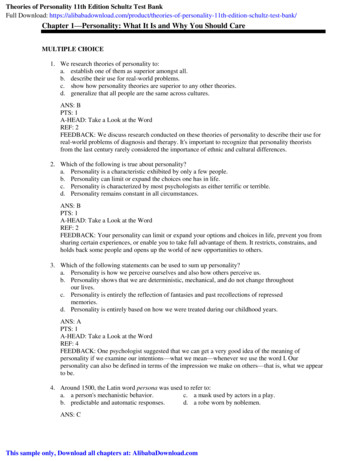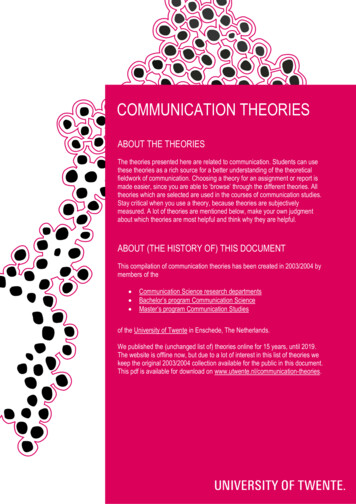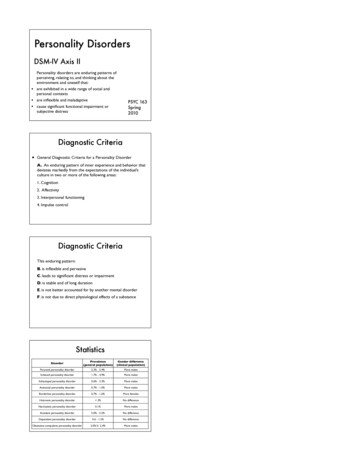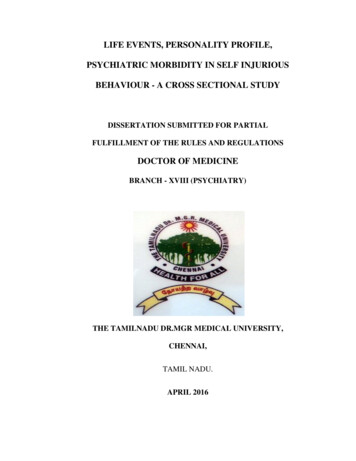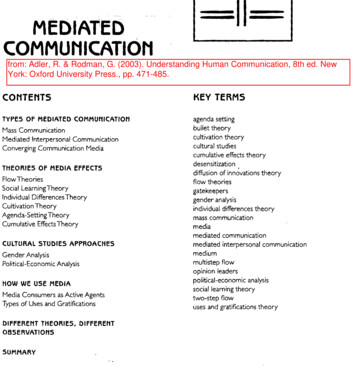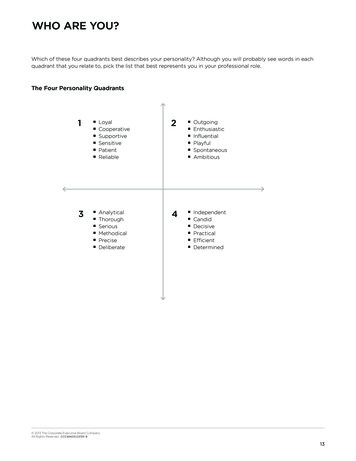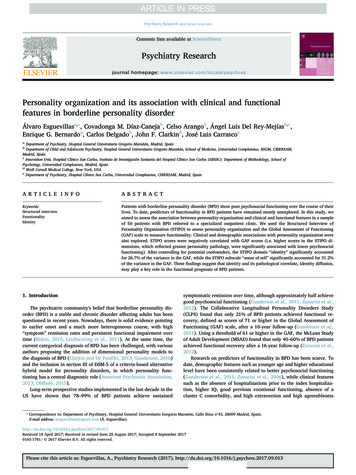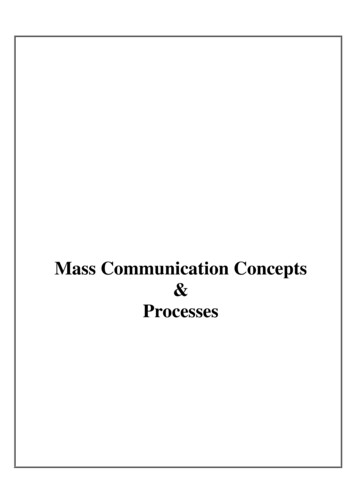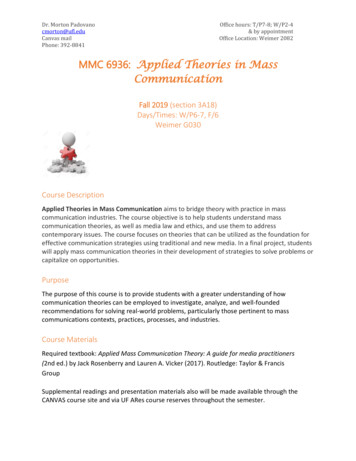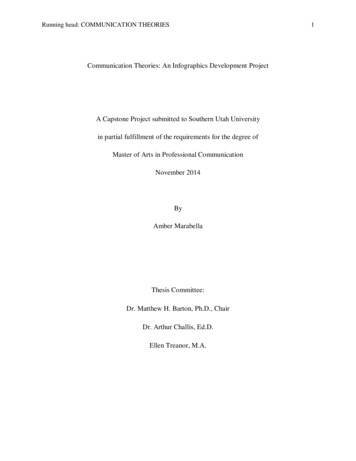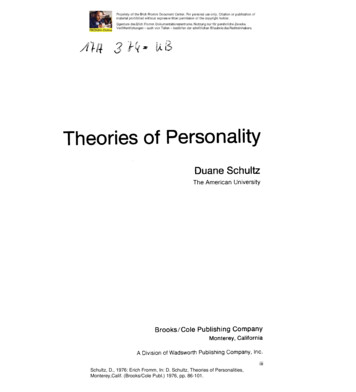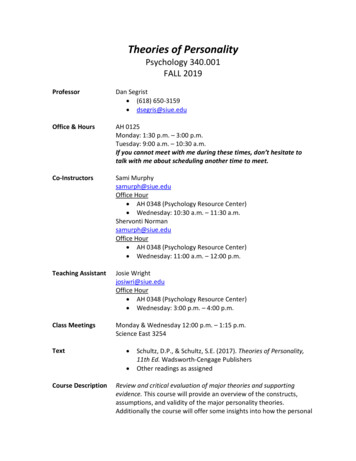
Transcription
Theories of PersonalityPsychology 340.001FALL 2019ProfessorDan Segrist (618) 650-3159 dsegris@siue.eduOffice & HoursAH 0125Monday: 1:30 p.m. – 3:00 p.m.Tuesday: 9:00 a.m. – 10:30 a.m.If you cannot meet with me during these times, don’t hesitate totalk with me about scheduling another time to meet.Co-InstructorsSami Murphysamurph@siue.eduOffice Hour AH 0348 (Psychology Resource Center) Wednesday: 10:30 a.m. – 11:30 a.m.Shervonti Normansamurph@siue.eduOffice Hour AH 0348 (Psychology Resource Center) Wednesday: 11:00 a.m. – 12:00 p.m.Teaching AssistantJosie Wrightjosiwri@siue.eduOffice Hour AH 0348 (Psychology Resource Center) Wednesday: 3:00 p.m. – 4:00 p.m.Class MeetingsMonday & Wednesday 12:00 p.m. – 1:15 p.m.Science East 3254Text Course DescriptionSchultz, D.P., & Schultz, S.E. (2017). Theories of Personality,11th Ed. Wadsworth-Cengage PublishersOther readings as assignedReview and critical evaluation of major theories and supportingevidence. This course will provide an overview of the constructs,assumptions, and validity of the major personality theories.Additionally the course will offer some insights into how the personal
and professional lives of the foremost personality theoristsinfluenced the theories they developed.Course ObjectivesExpectations andPoliciesIt is my goal that by the completion of this course you will havedemonstrated: an increased knowledge of the major personality theoristsand an understanding of their theories increased knowledge about theoretical constructs associatedwith a variety of personality theories an increased knowledge of some of the major tools used inpersonality assessment an ability to apply personality theories an ability to communicate information about personalitytheories and/or constructs in writing Attend lectures and participate in class discussion/activities.We all learn from each others’ opinions, thoughts, andquestions. Your participation not only enhances your learningexperience but also contributes to the learning experience foreach of us. Complete assigned reading as scheduled. The majority ofreading in this course will come from the text; however, I mayoccasionally provide you with supplemental reading material.I will not cover all text material in class and so it is critical thatyou keep up with the reading. Turn in assignments by the deadline. Typically lateassignments will not be accepted. In cases of documentedemergencies exceptions may be made. It is up to the studentto talk with the instructor about whether an exception can bemade. Unless otherwise noted you will turn in all assignmentsthrough Blackboard. Submit all assignments as Worddocuments. It is your responsibility to check Blackboard and be sure tocheck your email—including your SIUE email—for any courserelated announcements. If you must miss an exam because you are involved in aUniversity-sponsored activity (e.g., member of a sports team,etc.) you may take an exam early. To do this you must notifyuse at least one week prior to the exam to arrange a testdate.
If you must miss an exam because of a personal/familyemergency (e.g., death in the family) you will only be eligiblefor a make-up exam if you: notify us immediately and providedocumentation for the event that caused you to miss theexam. Make-up exams, if granted, are in a short answer/essayformat. If you miss class you are still responsible for the materialcovered that day in class, assignments given out that day, andfor any assignments due that day. Assignments not turned inon the due date will be considered late and points will bededucted. “I wasn’t here that day” is NOT an acceptableexcuse for turning in a late assignment, not getting a newassignment, or not getting handouts/notes. When you missclass it is up to you to get the notes and handouts fromanother student. You may also see me during office hours toget handouts you’ve missed. Students needing accommodations because of medicaldiagnosis or major life impairment will need to register withAccessible Campus Community & Equitable Student Support(ACCESS) and complete an intake process beforeaccommodations will be given. Students who believe theyhave a diagnosis but do not have documentation shouldcontact ACCESS for assistance and/or appropriate referral.The ACCESS office is located in the Student Success Center,Room 1270. You can also reach the office by e-mail atmyaccess@siue.edu or by calling 618.650.3726. For moreinformation on policies, procedures, or necessary forms,please visit the ACCESS website at www.siue.edu/access.Behavior in class As a courtesy to your classmates, please turn cell phones andto a “non-ringing” mode. No headphones may be worn duringclass. Do not text during class or use electronic devices for anythingbut taking notes. Use of electronic devices for texting and/orsurfing the Internet is a distraction to the students aroundyou and to the instructors. I want you to be engaged in the material and to discuss it withyour classmates. But please limit private conversations duringclass—if excessive these are not only rude but distracting anddisruptive, so please save them for outside of the classroom.
Be on time for class. Consistently coming into class late—even“just a couple of minutes”— is inappropriate and verydisruptive. Please do not do homework for other classes, study for otherexams, or sleep during class. Please do not pack up books and belongings before class isover. This very disruptive. Show respect for your classmates’ ideas and opinions. Ascollege students I expect you to be open to a variety ofviewpoints and opinions—even though you may disagree withthem.PsychologyDepartment Policyon IncompleteGrades andWithdrawalsAll withdrawals must be completed by the end of the 13th week ofclasses during fall and spring, and by a similarly late date (i.e., before82% of class meetings have occurred) in any summer term. Gradesthat apply to students who initiate a withdrawal and grades thatapply when a student fails to officially withdraw within establisheddeadlines are determined by university policy (seehttp://www.siue.edu/policies/1j1.shtml).The granting of a grade of I (Incomplete) is not automatic. It isavailable only in cases when a student has completed most of thework required for a class but is prevented by a medical or similaremergency from completing a small portion of the courseworkbefore the deadline for grade submission. An I must be approved bythe instructor with appropriate documentation provided by thestudent. If an instructor agrees to give a student an I, the instructorwill fill out a Memorandum of Incomplete Grade to be kept with thestudent’s records. If the work is not completed by the time specifiedon the Memorandum, the student’s grade will be changed from I toF.PsychologyDepartment Policyon PlagiarismPlagiarism includes either presenting someone else’s words withoutquotation marks (even if you cite the source) or presenting someoneelse’s ideas without citing that source. If you plagiarize, yourinstructor cannot evaluate your understanding of the topic. Whenparaphrasing from another source, at the very least the studentshould change the wording, sentence syntax, and order of ideaspresented in the paper. Ideally, the student will integrate ideas frommultiple sources while providing critical commentary on the topic in away that clearly identifies whether words and ideas are those of thestudent or are from another source. Plagiarism is one type ofacademic misconduct described in SIUE's Student Academic Code(http://www.siue.edu/policies/3c2.shtml). University policy states
that “Normally a student who plagiarizes shall receive a grade of F inthe course in which the act occurs. The offense shall also be reportedto the Provost.” (http://www.siue.edu/policies/1i6.shtml). TheUniversity policy discusses additional academic sanctions includingsuspension and expulsion from the University. To insure that youunderstand how to avoid plagiarism, I encourage you to review theinformation on plagiarism provided on the Department of Psychologyweb page at m.shtmlPsychologyDepartmentWriting PolicyAs a student in this course, you will be expected to display universitylevel writing, which includes completing course assignments thatmeet the following basic writing criteria. Specifically, all writtenassignments completed for this course should include: clear transitions from sentence to sentence and idea to idea(e.g., paper is organized/flows well); verb tense consistency; clear and unambiguous sentences and ideas; writing that is free of typos, spelling errors, and majorgrammatical errors; properly formatted citations and references (if relevant).This is by no means an exhaustive list of basic writing skills, but willgive you an idea of what we are looking for in our papers. If you feelyou need help with your writing, you are encouraged to seekassistance from the writing center on campus(http://www.siue.edu/is/writing) or utilize one of the many onlineresources they have identified to help shtml). If your gradedwritten assignments fail to meet the basic writing requirements listedabove (and any others found to be appropriate by your instructor),the instructor will stop the grading process and return the paper toyou (see below for the specific policy for this class). The penalty for unacceptable writing includes a loss of pointson the corresponding assignment as well as the possibility of afailing grade for that assignment.
Course GradesYour course grade will be based on your combined performance onexams and assignments.Course Grade*A: 252 – 280 pointsExamsB: 224 – 251 points Exam 1:50 pointsC: 196 – 223 points Exam 2:50 pointsD: 168 – 195 points Exam 3:50 pointsF: 168 pointsAssignments Syllabus Quiz Freud and Reality TV: NEO Inventory Reflection Case Study (choose two):AdlerCosta & McCraeRotterMaslow10 points30 points30 points60 points (30 points each)If any extra credit points are offered during the semester thosepoints will only be kept in your point total IF YOU HAVE COMPLETEDALL ASSIGNMENTS AND TURNED THEM IN ON TIME.*there is no “rounding up” for final grades
TENTATIVE CLASS SCHEDULEAugust 19Review syllabus WATCH: Julian Baggini – Is there a real you? (video link onBlackboard) Complete syllabus quiz by 11:59 p.m. on 8/20/19August 21What is “personality”?Assessment of personality READ: Chapter 1 (pp. 1-24; 29-32)August 26Freud READ: Chapter 2August 28FreudSeptember 2NO CLASS – LABOR DAY HOLIDAYSeptember 4FreudSeptember 9Jung September 11Jung READ: Chapter 3WATCH: Susan Kane – The power of introverts (video link onBlackboard)September 16Adler READ: Chapter 4September 18Adler DUE: Freud and Reality TV assignment (by 11:59 a.m.)September 23Horney READ: Chapter 5September 25HorneySeptember 30EXAM 1October 2Erikson READ: Chapter 6
October 7Erikson DUE: Adler Case Study (by 11:59 a.m.)October 9Skinner READ: Chapter 12October 14SkinnerOctober 16Factor AnalysisEysenck READ: Chapter 8 (pp. 226-230)October 21The Five-Factor Model READ: Chapter 8 (pp. 230-238)October 23Paulhus and Williams – The Dark Triad/TetradZuckerman – Sensation Seeking READ: Chapter 8 (pp. 240-241); Chapter 14 (pp. 378-385)October 28EXAM 2October 30MischelRotter READ: Chapter 14 (pp. 372-377) DUE: NEO Reflection (by 11:59 a.m.)November 4RotterNovember 6Bandura READ: Chapter 13 DUE: Costa & McCrae Case Study (by 11:59 a.m.)November 11Rogers READ: Chapter 10November 13Maslow READ: Chapter 9November 18Positive Psychology READ: Chapter 14 (pp. 395-403); Compton, 2005 – Chapters 1& 12 (available on Blackboard) DUE: Rotter Case Study (by 11:59 a.m.)
November 20Positive PsychologyNovember 25NO CLASS – THANKSGIVING BREAKNovember 27NO CLASS – THANKSGIVING BREAKDecember 2Positive PsychologyDecember 4Positive Psychology DUE: Maslow Case Study (by 11:59 a.m.)FINAL EXAMEXAM 3 – Monday, December 9, 10:00 a.m. – 11:40 a.m.
Text Schultz, D.P., & Schultz, S.E. (2017). Theories of Personality, 11th Ed. Wadsworth-Cengage Publishers Other readings as assigned Course Description Review and critical evaluation of major theories and supporting evidence. This course will provide an overview of the constructs, assumptions, and val
